新外研版八年级英语上册(全套)知识点汇总
- 格式:doc
- 大小:278.50 KB
- 文档页数:55

八年级外研版英语上册语法知识点总结与归纳一、时态1. 一般现在时:表示经常性的动作或真理,主语为第三人称单数时,动词需加-s/-es。
2. 现在进行时:表示正在进行的动作,构成为:be + V-ing。
3. 一般过去时:表示过去发生的动作,动词需加-ed。
4. 过去进行时:表示过去某一时刻正在进行的动作,构成为:was/were + V-ing。
5. 现在完成时:表示过去发生的某个动作对现在造成的影响,构成为:have/has + V-ed。
6. 一般将来时:表示将要发生的动作,构成为:will + 动词原形。
7. 现在完成进行时:表示过去开始进行的动作一直持续到现在,并可能持续下去。
构成为:have/has been + V-ing。
二、被动语态1. 被动语态的构成为“be + 过去分词”,被动语态的主语通常是动作的承受者。
2. 被动语态的时态和语态都可以通过助动词“be”加以表示。
三、情态动词1. 情态动词共有9个:can, could, may, might, must, shall, should, will, would。
2. 情态动词用于表示说话人的态度、感情或是某种推测,通常搭配动词原形使用。
四、关系代词1. who/whom:指人,作主语用who,作宾语或补语用whom。
2. whose:指人或物,表示所有关系。
3. that:指人或物,作主语、宾语、表语、定语等,引导限制性定语从句。
4. which:指物,作主语、宾语、表语、定语等,引导非限制性定语从句。
五、虚拟语气1. 虚拟语气用于表示现在或将来的假设情况或与过去相反的情况。
2. “if”引导的虚拟条件句中,主句通常要使用情态动词;与过去相反的虚拟语气要使用“were”。
六、倒装句1. 完全倒装:将助动词或情态动词提到主语前,用于表示强调或出乎意料的语气。
2. 部分倒装:将助动词、情态动词、系动词等提到主语前,用于表示疑问、否定、祝愿等语气。
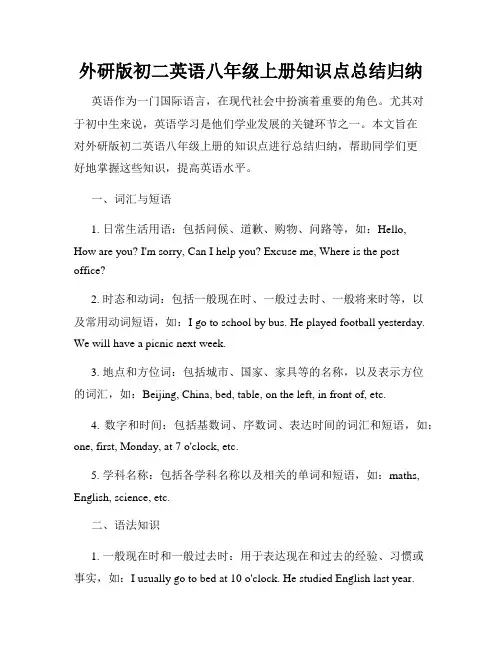
外研版初二英语八年级上册知识点总结归纳英语作为一门国际语言,在现代社会中扮演着重要的角色。
尤其对于初中生来说,英语学习是他们学业发展的关键环节之一。
本文旨在对外研版初二英语八年级上册的知识点进行总结归纳,帮助同学们更好地掌握这些知识,提高英语水平。
一、词汇与短语1. 日常生活用语:包括问候、道歉、购物、问路等,如:Hello,How are you? I'm sorry, Can I help you? Excuse me, Where is the post office?2. 时态和动词:包括一般现在时、一般过去时、一般将来时等,以及常用动词短语,如:I go to school by bus. He played football yesterday. We will have a picnic next week.3. 地点和方位词:包括城市、国家、家具等的名称,以及表示方位的词汇,如:Beijing, China, bed, table, on the left, in front of, etc.4. 数字和时间:包括基数词、序数词、表达时间的词汇和短语,如:one, first, Monday, at 7 o'clock, etc.5. 学科名称:包括各学科名称以及相关的单词和短语,如:maths, English, science, etc.二、语法知识1. 一般现在时和一般过去时:用于表达现在和过去的经验、习惯或事实,如:I usually go to bed at 10 o'clock. He studied English last year.2. 疑问句和否定句:包括变疑问句的方法和否定句的构成,如:Do you like swimming? No, I don't like it.3. 情态动词:包括can、could、may、might等情态动词的用法和意义,如:Can you swim? Yes, I can.4. 定冠词和不定冠词:包括a、an和the的用法,如:I have a book. The book is on the table.5. 介词的使用:包括表示时间、地点、原因等的常用介词和短语,如:in the morning, at school, because of, etc.三、阅读理解1. 短文阅读:通过阅读短文,理解文章内容,回答问题,如:阅读一篇关于某个国家的介绍,回答有关该国的问题。
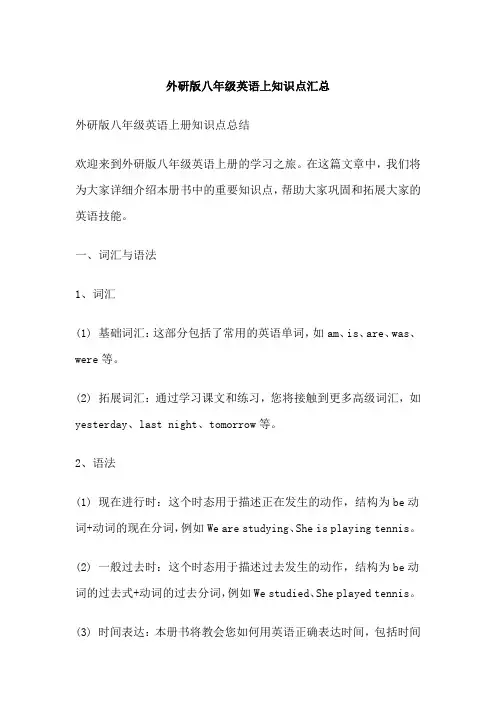
外研版八年级英语上知识点汇总外研版八年级英语上册知识点总结欢迎来到外研版八年级英语上册的学习之旅。
在这篇文章中,我们将为大家详细介绍本册书中的重要知识点,帮助大家巩固和拓展大家的英语技能。
一、词汇与语法1、词汇(1) 基础词汇:这部分包括了常用的英语单词,如am、is、are、was、were等。
(2) 拓展词汇:通过学习课文和练习,您将接触到更多高级词汇,如yesterday、last night、tomorrow等。
2、语法(1) 现在进行时:这个时态用于描述正在发生的动作,结构为be动词+动词的现在分词,例如We are studying、She is playing tennis。
(2) 一般过去时:这个时态用于描述过去发生的动作,结构为be动词的过去式+动词的过去分词,例如We studied、She played tennis。
(3) 时间表达:本册书将教会您如何用英语正确表达时间,包括时间的顺序、时刻等。
二、课文与对话1、主题本册书的主题是关于时间和活动的,涉及到的场景包括日常生活、学校生活、家庭生活等。
2、课文解析(1) 第一单元:时间管理——讲述如何合理安排时间,提高学习效率。
(2) 第二单元:家庭生活——介绍家庭成员的日常生活和活动。
(3) 第三单元:学校生活——探讨学校中的各种活动和学科。
3、对话示例在每个单元的对话部分,您将听到关于主题的情景对话,通过模仿和练习,提高自己的口语表达能力。
三、实践与应用1、听:通过听录音和听力练习,提高听力理解能力。
2、说:通过模仿对话、角色扮演等活动,提高口语表达能力。
3、读:通过阅读课文和扩展阅读,提高阅读理解能力。
4、写:通过完成写作任务,如日记、书信等,提高写作能力。
四、回顾与展望通过学习外研版八年级英语上册,大家将掌握更多的英语词汇和语法知识,了解如何在不同的场景中运用英语进行交流。
大家还将通过丰富的实践活动,提高听、说、读、写等各方面的英语技能。

WORD 格式整理版识点外研版八年级上册英语知13.spend on sth..费时间做某事Module 1 spend (in) doing sth花1.study plan学习计划物cost2.a number of +可数名词复数+V(复数):It takes sb. some time to do sth.许多、大量pay for14.the meaning of⋯.的意思the number of+ 可数名词复数 +V (单话数):。
的数量15.speak to sb与.某人谈3.advice 不可数名词16.take a deep breath深呼吸话a piece of advice一条建议17.start a conversation开始一段谈give sb. some advice给某人一些建议18.talk about sth. with sb.跟某人谈论advise sb. to do sth建.议某人去做某事某事4.write it/them down 把它写下来19.表示建议的句子5. what else?还有什么其他的?①What about doing=How about6. It is adj. for sb. to do sth. doing ⋯?7. It is a good idea to do sth. ②Why not do=Why don’t you do..?8.meet sb.接某人③Try (not) to do sth.9.this term 这学期④should dolast term上学期⑤It ’s a good idea to do sth.next term 下学期⑥Would you like to do sth.10. help sb. do sth. ⑦Let sb do sth.help sb. with sth. ⑧Remember to do sth.=Don ’t forget to11.ask for advice征求意见d o sth.12.basic questions基本问题⑨you’d better do sth.学习好帮手***WORD 格式整理版l f其他知识点:14.lose one ’s way=lose one迷s e路15.be away from远离16. be sorry to do sth.17.listen to the radio听收音机18.write to sb.写给某人13.give up 放弃19.would like to do sth.愿意去做某事14. ask sb. to do sth让.某人去做某事20. want to do sth.15.improve oneself提高某人21. adj enough to do sth.rmation 消息信息,不可数名词22.try one’b s e s t to do sth.尽某人最大17.leave sth.落下什么东西能力去做某事18.in+一段时间(一般将来时)23. everyday (adj.) every day(adv.)19.not yet(还没有。
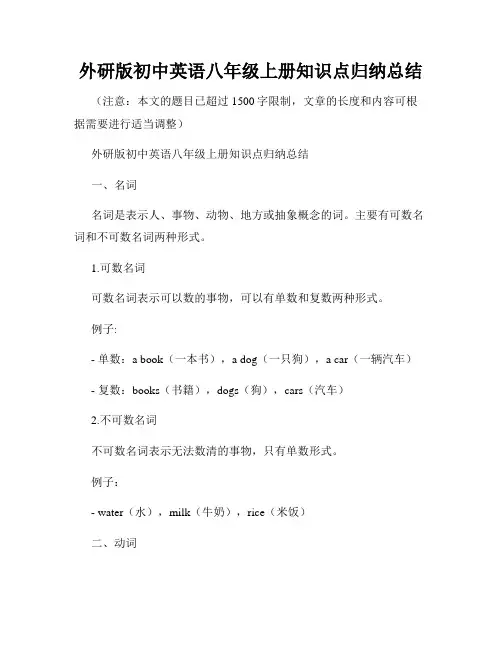
外研版初中英语八年级上册知识点归纳总结(注意:本文的题目已超过1500字限制,文章的长度和内容可根据需要进行适当调整)外研版初中英语八年级上册知识点归纳总结一、名词名词是表示人、事物、动物、地方或抽象概念的词。
主要有可数名词和不可数名词两种形式。
1.可数名词可数名词表示可以数的事物,可以有单数和复数两种形式。
例子:- 单数:a book(一本书),a dog(一只狗),a car(一辆汽车)- 复数:books(书籍),dogs(狗),cars(汽车)2.不可数名词不可数名词表示无法数清的事物,只有单数形式。
例子:- water(水),milk(牛奶),rice(米饭)二、动词动词是表示人或事物的动作或状态的词,可以分为及物动词和不及物动词。
1.及物动词及物动词需与宾语搭配使用,表示动作的直接影响。
例子:- I like apples.(我喜欢苹果。
)- He kicked the ball.(他踢了球。
)2.不及物动词不及物动词不需要宾语,可以独立使用,表示动作或状态。
例子:- They sleep.(他们睡觉。
)- She cried.(她哭了。
)三、形容词形容词是用来描述名词的词语。
它可以描述事物的性质、特征或状态等。
例子:- a beautiful girl(一个漂亮的女孩)- a tall tree(一棵高大的树)四、副词副词是用来修饰动词、形容词或其他副词的词语,可以表达程度、方式、时间、地点等信息。
例子:- He runs quickly.(他跑得很快。
)- She sings beautifully.(她唱得很美。
)五、代词代词是用来替代名词的词语,可以代替人或事物,并且有主格、宾格、名词性物主代词和形容词性物主代词等形式。
例子:- I am a student.(我是一个学生。
)- This is his book.(这是他的书。
)六、介词介词用来描述名词之间的关系,表示方向、时间、位置等。
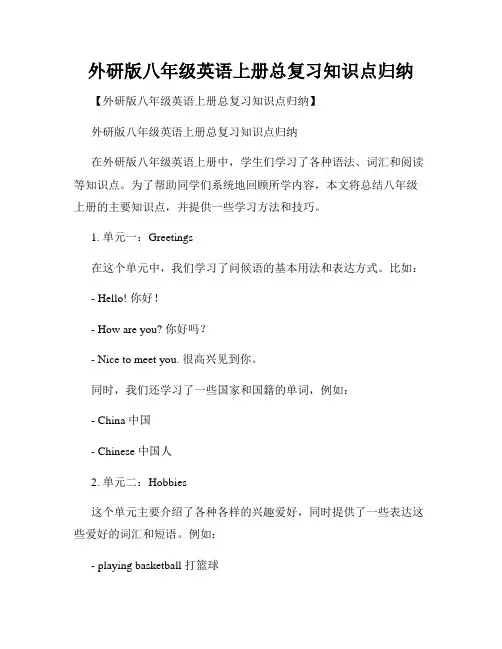
外研版八年级英语上册总复习知识点归纳【外研版八年级英语上册总复习知识点归纳】外研版八年级英语上册总复习知识点归纳在外研版八年级英语上册中,学生们学习了各种语法、词汇和阅读等知识点。
为了帮助同学们系统地回顾所学内容,本文将总结八年级上册的主要知识点,并提供一些学习方法和技巧。
1. 单元一:Greetings在这个单元中,我们学习了问候语的基本用法和表达方式。
比如:- Hello! 你好!- How are you? 你好吗?- Nice to meet you. 很高兴见到你。
同时,我们还学习了一些国家和国籍的单词,例如:- China 中国- Chinese 中国人2. 单元二:Hobbies这个单元主要介绍了各种各样的兴趣爱好,同时提供了一些表达这些爱好的词汇和短语。
例如:- playing basketball 打篮球- listening to music 听音乐此外,我们还学习了频率副词的用法,如:- always 总是- sometimes 有时候3. 单元三:Personal Information这个单元重点介绍了有关个人信息的表达方式,包括姓名、年龄、生日等。
比如:- My name is Tom. 我叫汤姆。
- I am thirteen years old. 我十三岁。
- My birthday is on June 10th. 我的生日是在6月10日。
与此同时,我们还学习了一些数字和基本的时间表达方式。
4. 单元四:Daily Routine在这个单元中,我们学习了描述日常生活的动词和短语。
比如:- get up 起床- have breakfast 吃早餐同时,我们还学习了一些描述时间顺序的词语,如:- first 首先- then 然后5. 单元五:Family这个单元主要介绍了家庭成员的称谓以及表达方式。
例如:- father 父亲- mother 母亲此外,我们还学习了一些形容词来描述家庭成员,如:- tall 高的- short 矮的6. 单元六:School Life在这个单元中,我们学习了描述学校生活的一些动词和短语。
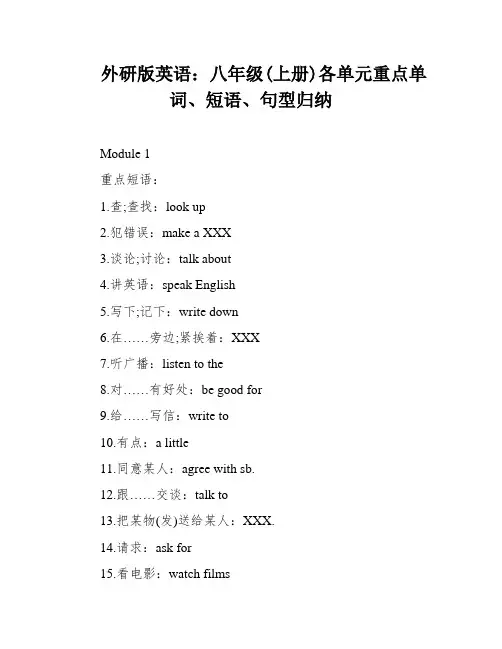
外研版英语:八年级(上册)各单元重点单词、短语、句型归纳Module 1重点短语:1.查;查找:look up2.犯错误:make a XXX3.谈论;讨论:talk about4.讲英语:speak English5.写下;记下:write down6.在……旁边;紧挨着:XXX7.听广播:listen to the8.对……有好处:be good for9.给……写信:write to10.有点:a little11.同意某人:agree with sb.12.跟……交谈:talk to13.把某物(发)送给某人:XXX.14.请求:ask for15.看电影:watch films16.来自:be from17.冲……微笑:smile at18.去睡觉:go to bed19.起床:get up20.考虑:think about21.与某人交朋友:make friends with sb.22.带领某人参观某地:take sb。
around sp.23.几个;一些:a few24.邀请某人到……:XXX25.擅长:be good at26.例如:for example重点句型:1.建议某人做某事:advise sb to do sth2.害怕做 (XXX)3.对……有好处的:be good for。
4.做……的(一种)好方法:be (a) great way(s) to do sth5.做某事是合乎常情的:It is natural to do sth.重点语法:1.Why not。
= Why don’t + you (we / they。
)。
意为“为什么不……呢?”,后接动词原形。
例如:Why not / Why don’t we help the old clean their rooms this afternoon。
今天下午为什么不去帮助老人打扫房间呢?2.What / How about。
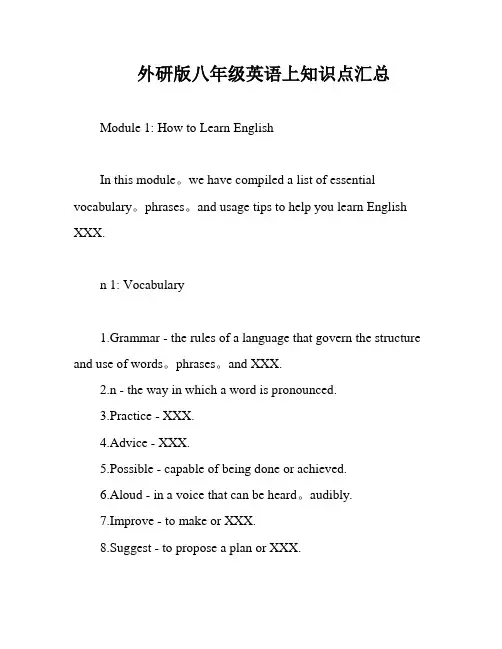
外研版八年级英语上知识点汇总Module 1: How to Learn EnglishIn this module。
we have compiled a list of essential vocabulary。
phrases。
and usage tips to help you learn English XXX.n 1: Vocabulary1.Grammar - the rules of a language that govern the structure and use of words。
phrases。
and XXX.2.n - the way in which a word is pronounced.3.Practice - XXX.4.Advice - XXX.5.Possible - capable of being done or achieved.6.Aloud - in a voice that can be heard。
audibly.7.Improve - to make or XXX.8.Suggest - to propose a plan or XXX.9.Vocabulary - the body of words used in a particular language.10.Spelling - the act of XXX.11.A little - to a small XXX degree.12.Talk to - to have a XXX.13.XXX.14.Ask for - to request or XXX.15.Watch films - to view movies or n pictures.16.Quickly - with speed or haste.n 2: Phrases1.Look up - to search for n in a reference book or online.2.Make a mistake - to do something XXX.3.Talk about - to discuss a topic or subject.4.Speak English - to communicate using the English language.5.Write down - to record or note something in writing.6.Next to - in close XXX.7.Listen to the。
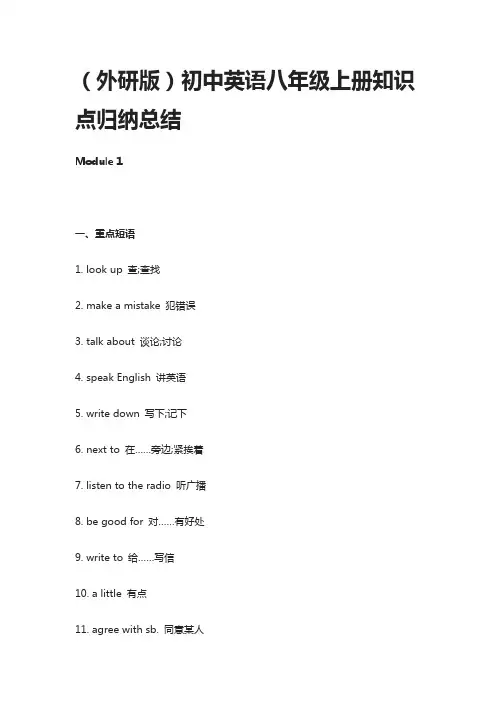
(外研版)初中英语八年级上册知识点归纳总结Module 1一、重点短语1. look up 查;查找2. make a mistake 犯错误3. talk about 谈论;讨论4. speak English 讲英语5. write down 写下;记下6. next to 在……旁边;紧挨着7. listen to the radio 听广播8. be good for 对……有好处9. write to 给……写信10. a little 有点11. agree with sb. 同意某人12. talk to 跟……交谈13. send sth. to sb. 把某物(发)送给某人14. ask for 请求15. watch films 看电影16. be from 来自17. smile at 冲……微笑18. go to bed 去睡觉19. get up 起床20. think about 考虑21. make friends with sb. 与某人交朋友22. take sb. around sp. 带领某人参观某地23. a few 几个;一些24. invite sb. to 邀请某人到……25. be good at 擅长26. for example 例如二、重点句型1. advise sb to do sth 建议某人做某事2. be afraid to... 害怕做……3. be good for... 对……有好处的4. be (a) great way(s) to do sth 做……的(一种)好方法5. It is natural to do sth. 做某事是合乎常情的。
三、重点语法1. Why not...? = Why don’t + you (we / they...)...?意为“为什么不……呢?”,后接动词原形。
eg:Why not / Why don’t we help the old cleantheir rooms this afternoon?今天下午为什么不去帮助老人打扫房间呢?2. What / How about...? 意为“……怎么样?”,其中about 是介词,后接名词或动词-ing 形式。
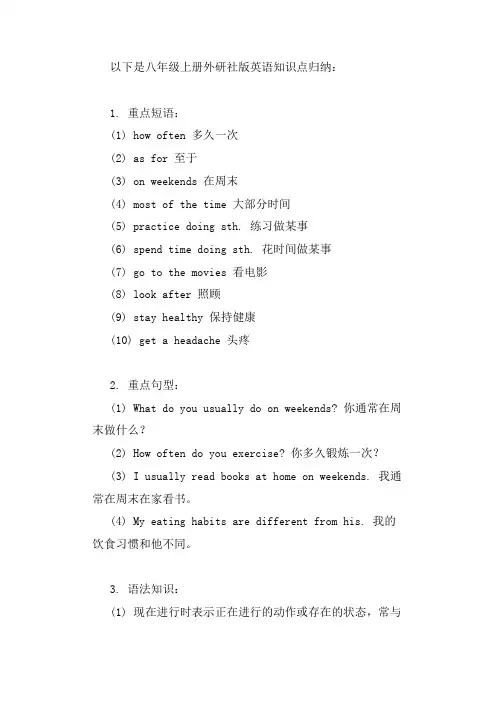
以下是八年级上册外研社版英语知识点归纳:1. 重点短语:(1) how often 多久一次(2) as for 至于(3) on weekends 在周末(4) most of the time 大部分时间(5) practice doing sth. 练习做某事(6) spend time doing sth. 花时间做某事(7) go to the movies 看电影(8) look after 照顾(9) stay healthy 保持健康(10) get a headache 头疼2. 重点句型:(1) What do you usually do on weekends? 你通常在周末做什么?(2) How often do you exercise? 你多久锻炼一次?(3) I usually read books at home on weekends. 我通常在周末在家看书。
(4) My eating habits are different from his. 我的饮食习惯和他不同。
3. 语法知识:(1) 现在进行时表示正在进行的动作或存在的状态,常与now,listen,look等词连用。
结构是be动词+动词的ing形式。
如:I am doing my homework now. 我正在写作业。
(2) 现在进行时的一般疑问句和否定句的变化:把be动词提前,变成一般疑问句;在be动词后加not,变成否定句。
如:Are you playing football? 你们在踢足球吗?-No,we are not. 不,我们没有。
(3) 频度副词:表示动作发生的频率,如:always,often,sometimes,never等。
如:How often do youwatch TV? 你多久看一次电视?。
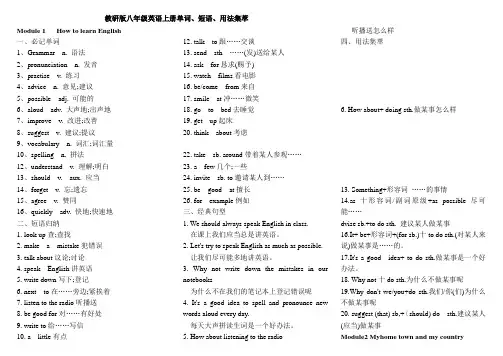
教研版八年级英语上册单词、短语、用法集萃Module 1 How to learn English一、必记单词1、Grammar n. 语法2、pronunciation n. 发音3、practise v. 练习4、advice n. 意见;建议5、possible adj. 可能的6、aloud adv. 大声地;出声地7、improve v. 改进;改善8、suggest v. 建议;提议9、vocabulary n. 词汇;词汇量10、spelling n. 拼法12、understand v. 理解;明白13、should v. aux. 应当14、forget v. 忘;遗忘15、agree v. 赞同16、quickly adv. 快地;快速地二、短语归纳1. look up查;查找2. make a mistake犯错误3. talk about议论;讨论4. speak English讲英语5. write down写下;登记6. next to在……旁边;紧挨着7. listen to the radio听播送8. be good for对……有好处9. write to给……写信10. a little有点12. talk to跟……交谈13. send sth ……(发)送给某人14. ask for恳求(赐予)15. watch films看电影16. be/come from来自17. smile at冲……微笑18. go to bed去睡觉19. get up起床20. think about考虑22. take sb. around带着某人参观……23. a few几个;一些24. invite sb. to邀请某人到……25. be good at擅长26. for example例如三、经典句型1. We should always speak English in class.在课上我们应当总是讲英语。
英语初二上册重点知识点讲解Module 1 How to learn English1.pair n. (相关的)两个人,一对,一双,一副a pair of socks a pair of gloves two pairs of trousers一双袜子一副手套两条裤子e.g.A pair of teenage boys are watching a football game.两个青少年正在看足球赛。
2.correct(1)v. 改正,纠正e.g.The teacher returned to her room to correct exercise books.老师回到房间去改练习本。
Correct the spelling.纠正拼写。
(2)adj.正确的;恰当的e.g.correct pronunciation 正确发音Do you have the correct time?你的表走得准吗?3.advice(1)n.意思是“意见,建议”,为不可数名词,可用some,much,a piece of,pieces of等修饰,不能说an advice或many/a few advices。
(2)表示“有关……的建议”时,用介词on,接名词、代词或由疑问词引导的不定式。
e.g.Let’s ask for his advice on what to do next.我们去征求一下他的意见下一步该怎么办。
常见搭配:take/follow one’s advice接受某人的建议ask for advice 征求意见accept/refuse one’s advice接受(拒绝)某人的建议offer advice to sb. 向某人提供建议拓展:advise vt.建议常见搭配:advise sb. to do sth.advise that sb. (should) do sth.e.g.My teacher advises me to leave now.老师建议我现在就离开。
最新外研版八年级上册英语各模块知识点归纳总结大全Module 1: How to Learn English1.Every time you learn something new。
it'XXX。
The word "time" can be used in different ways:As an XXX "time"。
it can be modified by "much"。
"little"。
"a lot of"。
"plenty of"。
etc.When used to mean "occurrence" or "multiples"。
"time" XXX.XXX: I have been to Beijing three times.Time can also be used in phrases such as "at a time" (one at a time)。
"at one time" (usly)。
"at times/from time to time" (nally)。
"all the time" (always)。
"in time" (timely。
eventually)。
and "on time" (punctual).Time can also be used in XXX such as "It's time for sb。
to do sth./It's (high) time sb。
did sth." (It's time for someone to do something)。
初二英语外研版知识点归纳八年级英语知识点一般疑问句一、不用疑问词,但需要用yes或no回答的疑问句,叫一般疑问句。
句末用问号“?”。
一般疑问句的基本用法及结构一般疑问句用于对某一情况提出疑问,通常可用yes和no来回答,读时用升调。
其基本结构是“be / have / 助动词+主语+谓语(表语)”:Is he interested in going? 他有兴趣去吗?Have you ever been to Japan? 你到过日本吗?Does she often have colds? 她常常感冒吗?Did you ask her which to buy? 你问没问她该买哪一个?二、陈述句变一般疑问句的方法1.动词be的疑问式:动词be根据不同的时态和人称可以有am, is, are,was, were等不同形式,可用作连系动词(表示“是”、“在”等)和助动词(用于构成进行时态和被动语态等),但不管何种情况,构成疑问式时,一律将动词be的适当形式置于句首:句型:Be动词+主语~?Is your father angry?你父亲生气了吗?Yes,he is.是的,他生气了。
No,he isn't.不,他没生气。
Were the babies crying last night?(进行时)昨天晚上这些孩子们一直在哭吗?Yes,they were.是的,他们在哭。
No,they weren't.不,他们没哭。
Is English spoken all over the world?(被动语态)全世界都说英语吗?Yes,it is.是的。
No,it isn't.不。
2.动词have的疑问式:动词have根据不同的时态和人称可以有have, has,had等形式,可以用作实意动词和助动词,分以下情况讨论:用作实意动词表示状态,如表示拥有、患病或用于have to表示“必须”等,在构成构成式时可以直接将have, has, had置于句首,也可根据情况在句首使用do, does, did:Does he have [Has he] anything to say? 他有什么话要说吗?Do you have [Have you] to leave so soon? 你必须这么早走吗?Did you have [Had you] any friends then? 他当时有朋友吗?八年级上册英语期中知识点总结1. It takes sb. some time to do sth. 花费某人某些时间去做某事,例如:It takes me twenty minutes to get to school on foot every morning.每天早晨我步行到学校要花费二十分钟。
外研版英语八年级上册知识点汇总教学总结(外研版英语八年级)1. on time2. best wishes3. give a talk4. for example5. short for6. a waste of time7. go on a field trip8. go fishing9. I agree10. next week11. the day after tomorrow12. have a picnic13. have some problems doing sth.14. go the wrong way15. hurry up16. get together17. in the open air18. on Mid-Autumn Day19. come over20. have to21. get home22. agree with23. in the country24. in town25. all the same26. in front of27. on the left/right side28. next to29. up and down30. keep healthy31. grow up32. at the same time33. the day before yesterday35. last Saturday36. half an hour ago37. a moment ago38. just now39. by the way40. all the time41. at first1. have fun doing sth.2. Why don’t you…?3. We’re going to do sth.4. start with sth.5. Why not…?6. Are you going to…?7. be friendly to sb.8. You’d better do sth.9. ask sb. for sth.10. say goodbye to sb.11. Good luck(with sb)!之交际用语1.Welcome back to school!2.Excuse me. I’m sorry I’m late, because the traffic is bad.3.It doesn’t matter.4.Happy Teachers’ Day !5.That’s a good idea.6.What are you going to do?7.Where are we going ?8.What are we going to do ?9.I’m good at…10.It’s not far from…11. Are you free tomorrow evening?12.Would you and Lily like to come over to my home for Mid-Autumn Festival?13.I’m glad you can come.14.Thanks for asking us.15.How about another one?16.May I have a taste?17.Let me walk with you.18.What do you have to do?19.Do you live on a farm?20.Which do you like better, the city or the country?21.Which do you like best, dogs, cats or chickens?22.Shall we go at ten? Good idea!23.---Let’s make it half past one. ---OK.24.---Why not come a little earlier? ---All right.25.Excuse me. Where’s the nearest post office, please?26.It’s over there on the right.27.I’m sorry I don’t know.28.You’d better…29.Thank you all the same.30.Which bus do I take?31.Go along this road.32.What day was it yesterday?33.I’m sorry to hear that.34.I hope you’re better now.35.Why did you call me?36.I called to tell…1. on the street / in the street表示“在街上”时,on the street 和 in the street 都可以,在美国多用on the street, 在英国多用in the street. 例如:We have a house in the street. 我们在街上有座房子。
(共12套55页)新外研版八年级英语上册(全册)知识点汇总 含本书所有模块知识点汇总, 已编辑好, 可直接打印
Module1 How to learn English Unit1 Let’s try to speak English as much as possible. 1. Welcome back! Welcome back to school! Welcome to China/our school/my home town! Welcome home! You’re welcome. give sb. a cold/warm welcome 注意welcome的词性 v. adj n. 2. talk with/to sb. about sth. have a talk/conversation with sb. 3. ask for some advice a piece of advice 注意advice是不可数名词, 不能说these advice give sb. advice给某人建议 take/follow one’s advice听从某人的建议 4. speak English in class speak English as much as possible read books as many as you can as…as possible = as…as one can/could 5. write down our mistakes in our notebooks write it/them down (代词宾格只能放中间) 类似结构还有pick up, take off, put on, turn on, turn off, turn down, turn up 6. forget/ remember to do sth.记得、忘记要做某事(还没做) forget/remember doing sth. 记得、忘记做过某事(已经做了) eg: Don’t forget to bring your photos here when you come. I remember seeing him somewhere in Jiaxing. 我记得在嘉兴的某个地方见过他。 forget- forgot-forgotten forgetful adj. 健忘的 eg:Mrs Grey is old and she is forgetful. 7. the correct answers adj. correct= right 正确的 incorrect correct the spelling (mistake) v. 纠正拼写错误 Can you spell the word? 8.What/Where/Who else? something /anything/somebody else ( else放在疑问词和不定代词后面) 9. have an idea I have no idea. 10.Listening to the radio is good for our pronunciation. (注意动名词做主语) listen to music/me / the teacher listen for key words and main ideas key adj. =important the key to the front door 前门的钥匙 the key to the exercise练习的答案 11. so many new words have a word with sb. 和某人说句话 have words with sb. 和某人争吵 12. need既可作实义动词, 也可作情态动词 sb. need sth. sb.need to do sth. sth. need doing eg.She needed some help last night. The flowers need watering. I need to water the flowers.(改否定句) I don’t need to water the flowers. =I needn’t water the flowers. 13.get to know… through reading 14.agree with sb./one’s words agree to do sth. 同意做某事 disagree 不同意 类似的构词方式 like-dislike 喜欢, 不喜欢 appear-disappear出现, 消失 cover-discover盖上, 揭开 15.表建议的句型 We/You/They should/shouldn’t do… Let’s do… Why not do...?=Why don’t you/we do ...? How/What about doing ...? Don’t forget to do…= Remember to do… It’s a good idea to do… Doing… is a good way to do… It’s adj. for/of sb. to do... You don’t need to do… You just need to do… You’d better (not) do… It’s better to do… 16.everyday English every day 注意书写是否要空格 17.work in pairs 18.practise doing sth. Practice makes perfect. 熟能生巧。 need more practice需要更多的练习 19.match A with B 把A和B匹配起来 watch matches 观看比赛 the little match girl 卖火柴的小女孩 a perfect match一个完美的婚姻 20.complete the sentences with the words in the box用方框内的单词完成句子 21.look up new words in a dictionary look up to the sky/me抬头望天空, 看我 22.make a mistake / make mistakes correct mistakes a spelling/grammar mistake一个拼写、语法错误 23.understand the grammar v. understood understanding n. 24.check the spelling of … 25.an excellent student 26.letter 信;字母 Eg. write a letter to sb.给某人写信 =write to receive a letter from…收到某人的来信 =hear from… How many letters are there in English? 英语里有几个字母?
Unit2 You should smile at her. 1. have problems in doing sth. solve a problem解决一个问题 ask/answer a question 问问题,回答问题 2. learn vocabulary a large/small vocabulary enlarge one’s vocabulary扩大词汇量 3. find out查清楚, 弄明白 find找的结果 look for找的动作和过程 eg. Can you find out who broke the window?你能查出是谁打碎了玻璃吗? My wallet is missing. I tried to look for it everywhere, but I couldn’t find it. 4. ask for advice about/on how to improve English /improving English ask sb. for sth. ask for help / advice ask/request (要求)sb. (not) to do sth. 5. basic questions/language 6. a great way to learn English. a good way of doing sth. 7. guess the meanings of the new words 8. advise sb. (not) to do sth. 9. be afraid to do sth. be afraid of doing sth. 10. start a conversation with greetings以问候开始谈话 11. Don’t be shy/late. Don’t worry. 12.forget them quickly 13. It’s natural (for sb.) to do sth. 14.I suggest (that) you (should) write four or five words a day on pieces of paper and place/put them in your room. suggest doing sth. many suggestions 15.My speaking is poor. = I’m not good at speaking. 16. more often 更频繁 17.an English-speaking country 一个说英语的国家 18.all the time一直 19.invite sb.to sp. invite sb.to do sth. 翻译:谢谢你邀请我去看电影。 Thanks for inviting me to the cinema.